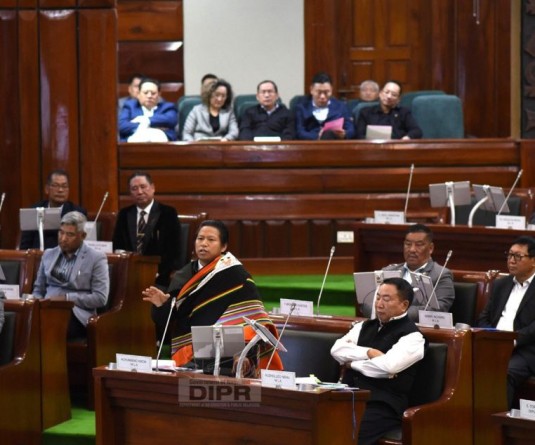
KOHIMA, AUG 3 (DIPR): Nagaland Governor, Shyamal Datta said that HIV/AIDS is a multi-dimensional problem requiring multi-lateral responsibility and initiatives at different levels including the Red Ribbon Clubs. Speaking at the one-day workshop for formation of Red Ribbon Clubs and Access to Safe Blood at Durbar Hall, Raj Bhavan, Kohima today, Datta said that for the last 25 years we have been living with HIV/AIDS and it is not a reason to celebrate. He said that the problem of HIV/AIDS is a battle, which should not develop into a war.
Referring to the Red Ribbon Club, Datta said that it is an important tool to convey the message of HIV/AIDS to the students. The objective of the Red Ribbon Club is to create consciousness on the youth about having the imperative need to have morally responsible behavior, Datta said and urged the colleges to give priority to the club. Stating that Red Ribbon stands as a symbol of solidarity for people living with AIDS Datta said that HIV/AIDS is a gigantic task, which is a job to be performed in a cohesive and coordinated manner by one and all.
Commenting on the Legislative Forum, which was formed in 2003 Datta said that the Forum has to set up the constitution with provision of working mechanism. Datta called upon the people to rally under the Legislative Forum with NSACS taking the lead.
He also hoped that the workshop would go a long way and the Red Ribbon Club will show the path for everyone to emulate. Datta also gave away a special award to former Dimapur Deputy Commissioner, Hekali Zhimomi IAS for her initiatives towards the cause of HIV/AIDS and for mobilizing a number of activities related with the cause during her tenure.
Addressing the gathering, the Chief Minister of Nagaland Neiphiu Rio, termed the formation of Red Ribbon Clubs and Access to Safe blood as a noble venture dedicated to the services of humanity.
Expressing his gratitude for the formation of Red Ribbon Clubs (RRC), Rio said, “RRC will become a source of peer education to give accurate information about HIV/AIDS, which will strengthen the process of responsible behavior among the youths”.
The Chief Minister cautioned that the spread of HIV/AIDS has become a threat to economy, development and stability. Describing young people in the age group of 15-29 years as the center of epidemic he called upon the gathering to invest their efforts, so as to engage the young people in the fight against HIV/AIDS by way of creating more employment opportunities, promoting sports etc to keep the youths engaged.
Rio asked the legislators to physically, morally and practically monitor and help the workers so as to bring out desired results. Stating that the State Government alone would not be able to combat HIV/AIDS, Rio sought the support of leaders of different levels. He further said that the success of the clubs would depend on the active support of patrons, principal, teachers, students’ union, police and NGOs. “The new initiative will go a long way in fulfilling the desired goals of preventing HIV/AIDS through behavioral change”, he said.
The Governor formally launched the documentary “Candles of Tuensang”. An introduction to the documentary was given by the Secretary, Eleuthorus Christian Society. It is film on the HIV/AIDS scenario in the district of Tuensang. It showcases some of the realities of HIV/AIDS prevailing in the district and how the church and the community have responded in the fight against HIV/AIDS. People living with HIV/AIDS discuss how they have been infected and how they have dealt with the affliction with the support of their families and the Churches Alliances.
The Red Ribbon Club was launched with the Governor decorating the patrons and members of Baptist College and Sazolie College with the Red Ribbons.
It is a movement to create and raise awareness about HIV/AIDS through service, education and events and will be a part of the Student Body in all colleges. The Board objectives of the Red Ribbon Clubs are to promote responsible behaviour, dissemination of information through peer educators, strengthen Voluntary Blood Donation movement and involve the youth in planning and implementation.
Presenting the status report and work plan, Secretary, Health and Family Welfare, Imkonglemba, IAS, gave the HIV/AIDS scenario in India (2005) where he stated out of the 52 lakh people infected with HIV/AIDS, 90% are in the age group of 15 to 49 years and 32.2% of the total infected areas are in the age group of 15 – 29 years. As on May 2006 Imkonglemba said that in Nagaland there are 994 reported cases of AIDS and 320 AIDS related deaths. Out of 3629 HIV positive in the state, 50% of the infected are in the age group of 15 – 29. He also explained at length about the District AIDS Committees (DACs), Red Ribbon Club and Voluntary Blood Donation.
Secretary, IRCS, Nagaland, State Branch gave a report on status of Voluntary Blood Donation. The IRCSN have been working tirelessly to uplift the people and have been conducting a number of camps for Voluntary Blood Donation. So far the IRCSN has conducted 28 Voluntary Blood Donation collecting a total of 83 units of blood. They are 130 active volunteers and the Secretary stated that most of the volunteers fall in the age group of 17 – 30 years.
Principals of Baptist College and Sazolie College also shared during the programme. The keynote address was given by Joint Director, NACO. Vote of thanks was delivered by Project Director, NSACS.
The workshop was organized by Nagaland State AIDS Control Society (NSACS) and Department of Health and Family Welfare in collaboration with the Department of Higher Education.





